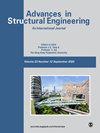超高性能钢筋混凝土柱的挠度限制
IF 2.6
4区 工程技术
Q2 CONSTRUCTION & BUILDING TECHNOLOGY
引用次数: 0
摘要
与传统钢筋混凝土柱相比,超高性能混凝土(UHPC)的横截面要小得多,这可能会使钢筋超高性能混凝土(R-UHPC)柱更容易受到纤度效应的影响。目前,设计标准中还没有关于 R-UHPC 柱细长限制的指导原则。因此,本文试图为确定 R-UHPC 柱的纤度极限制定一项设计规定。首先,本文提出了一个数值分析模型,用于预测偏心荷载下 R-UHPC 柱的荷载-挠度,并将其预测结果与现有文献中的实验结果进行了比较验证。在验证模型的基础上,进行了参数研究,以确定影响 R-UHPC 柱细长极限的关键参数。研究发现,强度降低 5%时的纤度极限对超高强度混凝土的极限压缩应变、超高强度混凝土的抗拉强度和配筋率非常敏感。在此基础上,统计得出了单曲率 R-UHPC 柱的纤度极限设计方程。此外,还以方便的形式为设计程序提出了非摇摆框架中 R-UHPC 柱的纤度极限。本文章由计算机程序翻译,如有差异,请以英文原文为准。
Slenderness limit for reinforced ultra-high-performance concrete columns
The use of ultra-high-performance concrete (UHPC) allows for much smaller cross-sections compared to conventional reinforced concrete columns, which may make reinforced UHPC (R-UHPC) columns more susceptible to slenderness effects. Currently, there is no guideline in design standards for the slenderness limit of R-UHPC columns. This paper, therefore, attempts to develop a design provision for determining the slenderness limit of R-UHPC columns. Firstly, a numerical analytical model was proposed for predicting the load-deflection of R-UHPC columns under eccentric loading, which was validated by comparing its predictions with available experimental results from the available literature. Based on the validated model, a parametric study was then conducted to determine the key parameters affecting the slenderness limit of R-UHPC columns. It was found that the slenderness limit corresponding to the 5% strength reduction was sensitive to the ultimate compressive strain of UHPC, the tensile strength of UHPC, and the reinforcement ratio. On this basis, a design equation for the slenderness limit of R-UHPC columns in single curvature was statistically derived. Additionally, the slenderness limit for R-UHPC columns in non-sway frames was also proposed in a convenient form for design procedures.
求助全文
通过发布文献求助,成功后即可免费获取论文全文。
去求助
来源期刊

Advances in Structural Engineering
工程技术-工程:土木
CiteScore
5.00
自引率
11.50%
发文量
230
审稿时长
2.3 months
期刊介绍:
Advances in Structural Engineering was established in 1997 and has become one of the major peer-reviewed journals in the field of structural engineering. To better fulfil the mission of the journal, we have recently decided to launch two new features for the journal: (a) invited review papers providing an in-depth exposition of a topic of significant current interest; (b) short papers reporting truly new technologies in structural engineering.
 求助内容:
求助内容: 应助结果提醒方式:
应助结果提醒方式:


